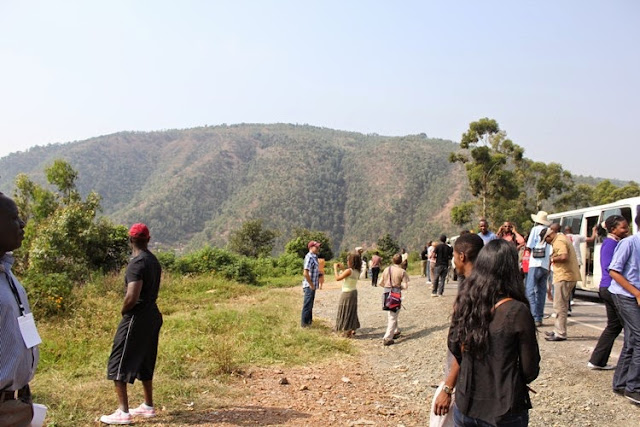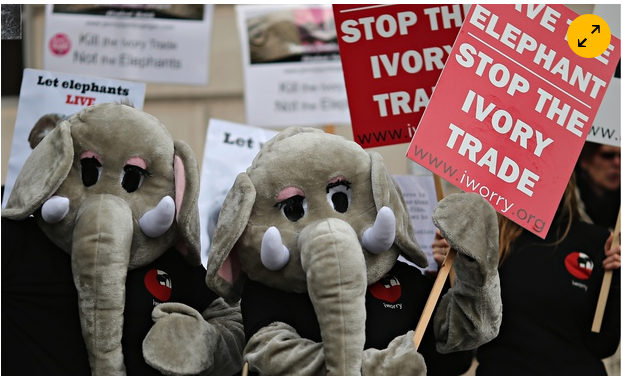Illegal wildlife trade
produces billions of dollars a year globally; it is the second most lucrative
illegal trading industry next to drug trafficking. Despite International and
local laws designed to crack down on the trade, live animals and animal parts,
often those of endangered or threatened species, are sold in open-air markets throughout
the many regions of the World.
Growing demand, leaky borders and the attraction
of big money make it a rewarding business, the animals involved in trafficking
end up as trophies, or in specialty restaurants. Some are used in Traditional
Asian medicines. Conventional on International Trade of Endangered Species of
fauna and flora (CITES) is there to make sure international trade in specimens
of wild animals and plants does not threaten their survival. Most of heavily
influenced by this Market is Asia, China in particular.
Wildlife campaigners during London conference on illegal wildlife trade,the wildlife illegal trade wh worth Euro 12 billion a year
In London declaration
in February, 2014, 46 countries met in London and signed the declaration on
illegal wildlife Trade, where they made a collective commitment to end this
courage, help communities that suffer from all Governments including:
Support for the CITES commercial prohibition
on international Trade in elephant ivory, until the survival of elephants in
the wild is no longer threatened by poaching.
Treating poaching and trafficking as
serious organized crime in the same category as drugs, arms and people
trafficking.
For the first time ever, renouncing the
use of any products from species threatened with extinction.
To recognize the importance of engaging
the communities living with wildlife as active partners in conservation and
reduce human conflict.
Increase capacity of local communities
to pursue sustainable livelihood opportunities and eradicate poverty.
To recognize the role that non-
governmental organizations, and academic institutions and Private sector can
play in actions against the illegal wildlife trade.
Support and where appropriate undertake,
effectively targeted actions to eradicate demand supply for illegal wildlife
products.
Address problems of corruption and money
laundering related to wildlife crime with legislation- “Zero tolerance policy”.
Effective international cooperation
demands the active participation of partners that support Governments in different
sectors: INTERPOL, CITES and The African Development Bank.
Participants Governments committed to 10
years moratorium on ivory sales, a ban on domestic ivory trade and decision to
put all ivory stocks beyond economic use.
Strengthen responses to wildlife crime
by increasing inter-agency checkpoints and border crossings, and address
hotpots of the illegal wildlife trade and stop shipments of animal parts

The large market of African elephant ivory is in Asia, particular in China
The consequences of
illegal trade in wildlife include:
Poaching
and trafficking undermines the rule of law and good governance, encourage
corruption. It
is organized and widespread criminal activity, involving transnational network. It
is linked with armed forces are engaged in international and cross border
conflicts. Rangers
and others dedicated to protect wildlife are being killed or injured in
significant numbers. Illegal
wildlife trade robs states and communities of their natural capital and
cultural heritages with serious economic and social consequences. It
damages the health of the ecosystems they depend on, undermining sustainable
economic development. Criminal
activity and corruption associated with trafficking restricts the potential for
sustainable investment and development which is needed in new economic
activities and enterprises.

A
photo made available 14 November 2013 shows confiscated ivory tusks, estimated
by US wildlife officials to be from around 2,000 elephants, at the National
Wildlife Property Repository, Denver, Colorado. Photograph: Alex Hofford/EP
Ethiopia, Botswana, Chad, Rwanda, and Uganda launched an elephant
protection initiative at the summit. Botswana will host a follow-up high-level
meeting in 2015 to discuss progress on tackling the wildlife trade






Comments
Post a Comment